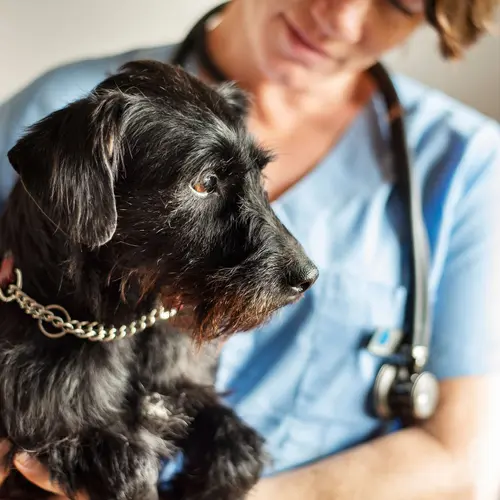Dogs, like humans, are susceptible to an eye disease called glaucoma. This condition causes high pressure inside the eyeball. Without treatment, dog glaucoma can lead to permanent damage or loss of vision.
What Is Glaucoma?
Glaucoma is a condition that causes abnormally high pressure inside the eyeballs. The inside of the eye contains a fluid called aqueous humor. This fluid holds oxygen and nutrients that all the parts of the eye need to function. The fluid is constantly replenished, and the used fluid drains out of the eye.
In cases of glaucoma, however, the aqueous humor doesn't drain properly. The result is excess fluid trapped in the eye. This causes pressure on the other structures in the eye, which can damage them. Over time, glaucoma can lead to vision loss.
What Causes Glaucoma in Dogs?
There are two types of glaucoma that affect dogs. One is called primary glaucoma, and it's something dogs develop over the long term. The second is secondary glaucoma, which develops due to other eye health issues.
Primary glaucoma. Primary glaucoma occurs when an otherwise healthy eye has abnormally high pressure. This is usually due to congenital abnormality in the anatomy of the eye. Certain dog breeds are more susceptible to primary glaucoma, including:
- Dalmatian
- Cocker spaniel
- Springer spaniel
- Poodle
- Basset hound
- Beagle
- Greyhound
- Great Dane
- Siberian husky
- Schnauzer
Secondary glaucoma. If the eye pressure is due to an injury or infection, it's called secondary glaucoma. This can happen due to conditions inducing:
- Uveitis (inflammation of the eye)
- Tumors
- Bleeding in the eye
- Injury to the lens, including lens dislocation
Symptoms of Glaucoma in Dogs
Glaucoma can change the way your dog's eye looks. The pressure can lead to a cloudy appearance that makes the whole eye look covered with a blue film. You may also notice that your dog's eye looks bloodshot or swollen.
Other symptoms of glaucoma include:
- Signs of pain such as pawing at the eye, keeping eye partially closed, and avoiding human touch near the eye
- Watery discharge from the eye
- Reduced eye movements and slow pupil responses
- Lethargy, loss of appetite, excessive sleeping, and unresponsiveness.
In some cases, the symptoms develop suddenly. This is known as acute glaucoma. If your dog has chronic glaucoma, you may not notice symptoms at first. As the pressure in your dog's eye gets worse, though, symptoms will become more obvious.
Any sign of glaucoma in dogs is an emergency. If you think your dog may have glaucoma, call your vet for an appointment. They can use an instrument called a tonometer to measure pressure in your dog's eye and diagnose the problem.
Treatment for Glaucoma in Dogs
The first priority in treatment for glaucoma in dogs' eyes is the reduction of pressure in the affected eye. Otherwise, pressure can damage the rest of the eye and lead to permanent vision loss or blindness. Some medicines decrease fluid production in the eye and encourage drainage of trapped fluid. You vet may offer pain relief if your dog is having discomfort from pressure in their eye.
If another injury or illness is causing the pressure to build up in your pet's eye, your doctor will recommend treatment for that as well.
The medicine used to control eye pressure will be a long-term treatment. Your dog will need to continue taking these medicines so glaucoma doesn't get any worse. They will also need follow-up care to make sure the medicine is working.
In some cases, your vet may suggest surgery to drain the excess fluid from the eye. They may suggest that you go to a veterinary ophthalmologist, a doctor specializing in treating animals' eye problems. They can perform a procedure to drain fluid from your dog's eye. You will need to follow up with long-term medication even after surgery.
If your dog does not respond to treatment or if glaucoma has led to blindness and discomfort, your doctor may suggest removing the affected eye. This will relieve any pain your dog is having. It can also reduce the risk of infection or injury in the eye.
Prognosis for Dogs with Glaucoma
Prognosis will depend on several factors. If you were able to get prompt treatment and your dog responds to medications, they can recover from glaucoma with no significant damage to their eyes. They will need ongoing treatment to prevent their eye pressure from increasing in the future, though.
If treatment is administered too late or is ineffective, your dog may lose their vision. Dogs can continue to live happy, healthy lives even if they have vision loss, though. Your vet or an animal trainer with experience with blind dogs can help you and your dog adapt.
In some cases, glaucoma is triggered by a serious health issue like cancer. If this is the case, your vet will discuss your pet's condition with you. There may be treatment available for the underlying disease.
If you have any concerns about your dog's eyes, you should talk to your vet right away.


